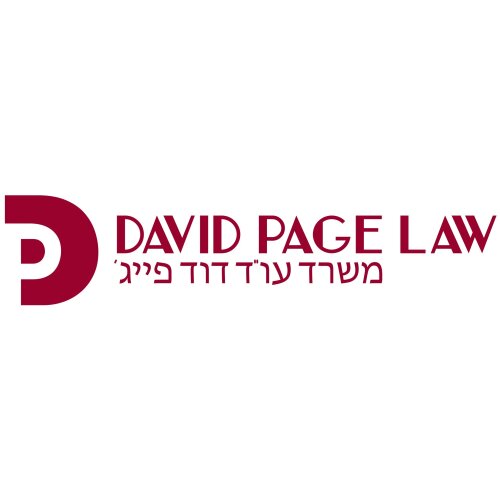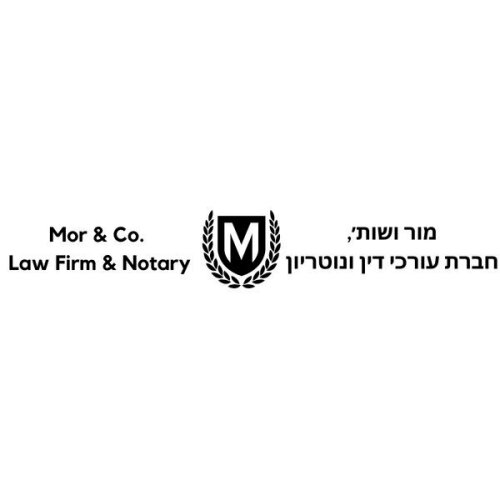Best Environmental Law & Compliance Lawyers in Jerusalem
Share your needs with us, get contacted by law firms.
Free. Takes 2 min.
List of the best lawyers in Jerusalem, Israel
About Environment Law in Jerusalem, Israel
Environment law in Jerusalem, Israel, encompasses a wide range of regulations and statutes aimed at protecting the natural environment within the city and its surrounding areas. Given Jerusalem's unique geographical, historical, and cultural significance, environmental protection is a crucial aspect of local governance. The legal framework in Jerusalem covers issues such as air and water quality, waste management, land use planning, conservation of natural habitats, and protection of historical and archaeological sites.
Why You May Need a Lawyer
There are several situations where you might require legal assistance in environmental matters in Jerusalem. These can include:
- Compliance with environmental regulations and standards
- Environmental impact assessments (EIA) for new developments
- Legal disputes over land use and zoning
- Property contamination issues and their remediation
- Enforcement of environmental protection laws
- Challenges against industrial or commercial pollution
- Advocacy and representation in public participation processes and environmental hearings
- Addressing infringements on protected natural areas or historical sites
Local Laws Overview
Jerusalem's environmental laws are defined by a mixture of local, national, and international regulations. Key aspects include:
- Cleansing and Hygiene Regulations: Ensuring proper waste disposal and management to maintain public spaces and prevent pollution.
- Planning and Building Law: Governing land use, development, and construction to ensure sustainable urban planning and environmental protection.
- National Parks and Nature Reserves Law: Protecting designated natural areas, flora, and fauna in and around Jerusalem.
- Clean Air Law: Setting standards for air quality and controlling emissions from industrial, commercial, and transportation sources.
- Water Pollution Prevention Ordinance: Regulating activities that could harm the quality of water bodies and underground water resources.
- Archaeological Preservation Law: Safeguarding historical and archaeological sites from damage due to development or other activities.
Frequently Asked Questions
What is an Environmental Impact Assessment (EIA) and when is it required?
An EIA is a study to predict the environmental effects of proposed projects before they are carried out. It is often required for large-scale construction, industrial activities, or any project likely to have a significant environmental impact.
How can I find out if a property is contaminated?
Conducting an environmental site assessment (ESA) is the standard method for determining property contamination. You can hire environmental consultants to perform the ESA.
What are the penalties for violating environmental laws in Jerusalem?
Penalties can include fines, cessation orders, and even imprisonment, depending on the severity of the violation. Specific penalties are outlined in different environmental statutes.
Can I challenge a building permit on environmental grounds?
Yes, you can file an objection to a building permit if the project poses a significant threat to the environment or violates environmental regulations.
Who enforces environmental laws in Jerusalem?
Enforcement is shared among various bodies including the Ministry of Environmental Protection, local municipal authorities, and the Israeli Nature and Parks Authority.
What should I do if I suspect illegal dumping in my area?
Report the suspected illegal dumping to the local municipal authority or the Ministry of Environmental Protection who will investigate the issue.
How do green building regulations affect construction projects?
Green building regulations require buildings to meet specific environmental performance standards, such as energy efficiency, water conservation, and sustainable material use.
Are there any incentives for using renewable energy in Jerusalem?
Yes, the government provides various incentives such as grants, tax breaks, and feed-in tariffs to encourage the use of renewable energy sources.
What is the process for obtaining a permit for a nature reserve visit in Jerusalem?
You typically need to contact the Israeli Nature and Parks Authority to obtain permits or make reservations for visiting sensitive natural areas or reserves.
Can historical sites be developed for commercial projects under any circumstances?
Development near or on historical sites is heavily restricted and requires approval from the Israel Antiquities Authority. In many cases, special conditions or mitigation measures will be imposed if development is permitted.
Additional Resources
The following resources can be valuable for individuals seeking legal advice or more information on environmental matters in Jerusalem:
- Ministry of Environmental Protection: This body regulates and enforces environmental policies and can provide guidance on environmental laws and compliance.
- Israeli Nature and Parks Authority: Responsible for managing nature reserves and national parks, providing information on conservation and related legal requirements.
- Jerusalem Municipal Authority: Offers local governance on urban planning, waste management, and environmental enforcement within Jerusalem.
- Environmental Consulting Firms: These firms provide specialized services such as environmental site assessments and compliance audits.
- Legal Aid Services: Organizations offering pro bono or low-cost legal assistance may help navigate environmental legal issues.
Next Steps
If you need legal assistance in environmental matters, consider taking the following steps:
- Identify Your Needs: Clarify the specific issue or project for which you need legal support.
- Consult an Environmental Lawyer: Seek out lawyers specializing in environmental law who are experienced with local regulations in Jerusalem.
- Gather Relevant Documents: Compile any necessary documentation, such as permits, site assessments, and correspondence with regulatory bodies.
- Prepare Questions: Make a list of questions and concerns to discuss with your lawyer to ensure a comprehensive consultation.
- Follow Legal Advice: Implement the guidance provided by your legal counsel to ensure compliance and protect your interests.
Lawzana helps you find the best lawyers and law firms in Jerusalem through a curated and pre-screened list of qualified legal professionals. Our platform offers rankings and detailed profiles of attorneys and law firms, allowing you to compare based on practice areas, including Environmental Law & Compliance, experience, and client feedback.
Each profile includes a description of the firm's areas of practice, client reviews, team members and partners, year of establishment, spoken languages, office locations, contact information, social media presence, and any published articles or resources. Most firms on our platform speak English and are experienced in both local and international legal matters.
Get a quote from top-rated law firms in Jerusalem, Israel — quickly, securely, and without unnecessary hassle.
Disclaimer:
The information provided on this page is for general informational purposes only and does not constitute legal advice. While we strive to ensure the accuracy and relevance of the content, legal information may change over time, and interpretations of the law can vary. You should always consult with a qualified legal professional for advice specific to your situation.
We disclaim all liability for actions taken or not taken based on the content of this page. If you believe any information is incorrect or outdated, please contact us, and we will review and update it where appropriate.















